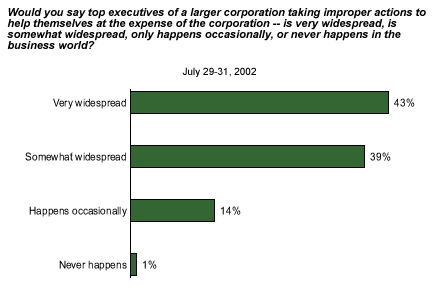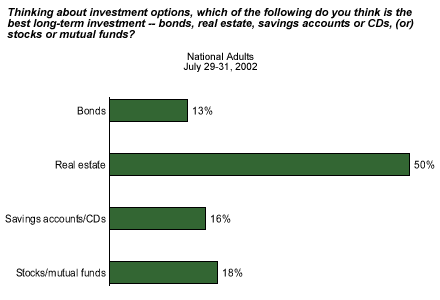During the past few weeks, the basic economic data that reflects the underlying strength of the U.S. economy has been weaker than expected. During the second quarter, and particularly in June and July, the economy has slowed significantly. In this regard, it appears that the "hard" economic measures are starting to catch up with recent public opinion data.
Attitudinal data on the economy from a July 29-31 Gallup poll* show that 49% of American consumers are worried they may need to cut back on their overall spending. This is another reflection of how plunging investor optimism and the declining stock market have negatively impacted consumer and employee confidence. As a result, economic stagnation, or worse, is likely in the second half of 2002.
Gallup's investor polling shows that concerns over inaccurate corporate reporting are damaging investor confidence. The key question is whether the combination of the SEC's requirement that CEOs certify their company reports and the corporate-responsibility legislation passed by Congress and signed by President Bush last week will alleviate investors' concerns.
Widespread Corporate Corruption
Initially, many observers suggested that today's accounting and corporate governance problems were isolated incidents. While some still argue that this is the case, 47% of Americans believe corporate corruption problems have gotten worse in the past few years.
Eight out of 10 people also believe that corporate corruption is widespread. Currently, 43% of the public feels that the practice of top executives of larger corporations taking improper actions to help themselves at the expense of their corporations is very widespread. Another 39% says that these improper practices are somewhat widespread in corporate America. Only 14% of the public believes these are somewhat isolated occurrences that happen occasionally.

Crisis of Confidence in Equities
During the late 1990s, conventional wisdom seemed to be that equities were the best long-term investments. The double-digit returns stockowners received during those years certainly reinforced this idea. In those days, it was common for six out of 10 Americans to tell Gallup that if they had a $1,000 to spend, investing it in the stock market would be a good idea. The crisis of confidence in equities is clearly reflected in Americans' opinions in July 2002 -- as nearly the same percentage (58%) now tell Gallup that investing in the stock market is a bad idea.
Given widespread corporate corruption and the related crisis of confidence in equities, what is the best long-term investment you can make? It is no longer equities according to today's public opinion. Instead, half of all Americans say it is real estate. And, significantly, 53% of stockowners share this view.

The Legislative Fix
If the corporate corruption problem was still seen as only a "bad apple" issue and not really much worse than in the past, then it could be argued that stronger law enforcement and tougher jail sentences for corporate miscreants might be the answer. Now, however, it will take much more to restore investor, consumer and employee confidence. In this regard, it is a promising sign that two out of three Americans believe new legislation and increased business regulation can have a major effect on solving the corporate corruption problem.
In the immediate term, the new SEC requirement that corporate executives affirm the accuracy of their company reports is a big step. But the focus on the Aug. 14 deadline for CEO affirmation illustrates the difficulties that will unfold in the months ahead. For example, many market observers believe there will be a lot of corporate restatements in the coming weeks. And in a number of instances, corporate executives may say they are unable to meet the new deadline. None of this will make corporate America look very good. On the other hand, once the cleansing process is complete, investors and the public will be able to have much greater confidence in the reports provided by U.S. corporations.
In the longer term, the new corporate corruption legislation is likely to have a much more significant impact on corporate America. It will take time for the full implications of this new legislation to unfold, but over time it will lead to another -- more complete -- cleansing process. Although one could argue that more must be done to clean up corporate corruption and the incentives that encourage it, there is every reason to believe that this new legislative fix will not only create a lot of pain for corporate America, but also help restore investor confidence over time.
*Results are based on telephone interviews with 1,003 national adults, aged 18 and older, conducted July 29-31, 2002. For results based on the total sample of national adults, one can say with 95% confidence that the maximum margin of sampling error is ±3%.

